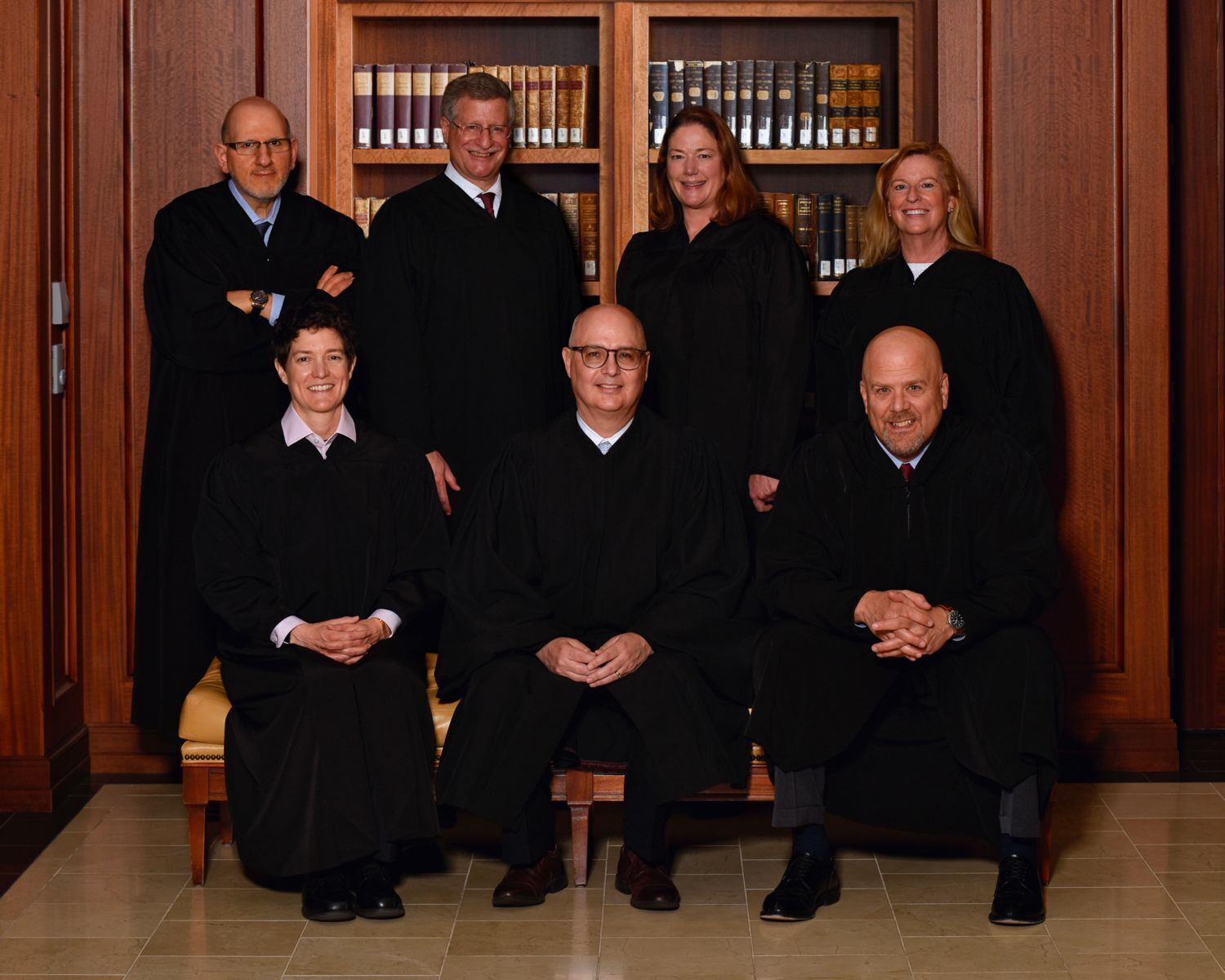In their own words: Colorado justices argue for or against disqualifying Donald Trump

Four of Colorado’s justices concluded on Tuesday that Donald Trump is ineligible for the presidency because he engaged in “insurrection” and that a rarely-invoked constitutional provision applies, indeed, to the president. Three justices dissented, alleging that the trial failed to afford the former president due process.
Notably, their action to disqualify Trump from the state’s presidential ballot became the first of any state supreme court to address head-on the substantive arguments of Trump’s – or any presidential candidate’s – eligibility.
Here are the justices’ arguments – in their own words.

From Justices Monica Márquez, William Hood, Richard Gabriel and Melissa Hart, who formed the majority
Whether states have the authority to exclude presidential candidates from the ballot
“Were we to adopt President Trump’s view, Colorado could not exclude from the ballot even candidates who plainly do not satisfy the age, residency, and citizenship requirements of the Presidential Qualifications Clause of Article II. It would mean that the state would be powerless to exclude a twenty-eight-year-old, a non-resident of the United States, or even a foreign national from the presidential primary ballot in Colorado.”
Whether the case is proper under Colorado’s Election Code
“Looming elections trigger a cascade of deadlines under both state and federal law that cannot accommodate protracted litigation schedules, particularly when the dispute concerns a candidate’s access to the ballot. And a state’s interest in ‘protecting the integrity of the election process and avoiding voter confusion’ allows a state to expedite the process by which a candidate’s qualifications, once challenged, are subsequently determined.”
Whether the district court afforded Trump due process
“The trial took place over five days and included opening and closing statements, the direct- and cross-examination of fifteen witnesses, and the presentation of ninety-six exhibits. Moreover, the legal and factual complexity of this case did not prevent the district court from issuing a comprehensive, 102-page order within the forty-eight-hour window section 1-4-1204(4) requires. … In short, the district court admirably – and swiftly – discharged its duty to adjudicate this complex section 1-1-113 action, substantially complying with statutory deadlines while demonstrating the flexibility inherent in such a proceeding to address the various issues raised by Intervenors.”
Whether Section 3 is self-executing
“If these Amendments required legislation to make them operative, then Congress could nullify them by simply not passing enacting legislation. The result of such inaction would mean that slavery remains legal; Black citizens would be counted as less than full citizens for reapportionment; nonwhite male voters could be disenfranchised; and any individual who engaged in insurrection against the government would nonetheless be able to serve in the government, regardless of whether two-thirds of Congress had lifted the disqualification. Surely that was not the drafters’ intent.”
Whether Section 3 applies to the presidency
“President Trump asks us to hold that Section Three disqualifies every oathbreaking insurrectionist except the most powerful one and that it bars oath-breakers from virtually every office, both state and federal, except the highest one in the land. Both results are inconsistent with the plain language and history of Section Three.”
Whether the congressional report on Jan. 6 is admissible
“First, President Trump claims the Report was biased against him because all nine Committee members voted in favor of impeaching him before their investigation began. Second, President Trump believes that the political backdrop against which the Report was created makes it unreliable. This argument proves too much. All congressional reports contain some level of political motivation, yet neither CRE 803(8) nor the corresponding federal rule declares such reports per se inadmissible; instead, as the district court explained, a court is at liberty to admit what it deems trustworthy.”
Whether Trump engaged in insurrection
“The question thus becomes whether the evidence before the district court sufficiently established that the events of January 6 constituted a concerted and public use of force or threat of force by a group of people to hinder or prevent the U.S. government from taking the actions necessary to accomplish the peaceful transfer of power in this country. We have little difficulty concluding that substantial evidence in the record supported each of these elements and that, as the district court found, the events of January 6 constituted an insurrection. … The evidence amply showed that President Trump undertook all these actions to aid and further a common unlawful purpose that he himself conceived and set in motion: prevent Congress from certifying the 2020 presidential election and stop the peaceful transfer of power.”
Whether Trump’s speech was protected by the First Amendment
“Our independent review of the record in this case brings us to the same conclusion: President Trump incited and encouraged the use of violence and lawless action to disrupt the peaceful transfer of power. The tenor of President Trump’s messages to his supporters in exhorting them to travel to Washington, D.C. on January 6 was obvious and unmistakable: the allegedly rigged election was an act of war and those victimized by it had an obligation to fight back and to fight aggressively.
From Chief Justice Brian D. Boatright, who dissented
Whether the case is proper under Colorado’s Election Code
“Although a claim that a candidate is not thirty-five years old may be easier to resolve than a claim that a candidate is not a natural born citizen, these presidential qualifications are characteristically objective, discernible facts. Age, time previously served as president, and place of birth all parallel core qualification issues under Colorado’s election code. Conversely, all these questions pale in comparison to the complexity of an action to disqualify a candidate for engaging in insurrection. … (The) framework that section 1-1-113 offers for identifying qualified candidates is not commensurate with the extraordinary determination to disqualify a candidate because they engaged in insurrection against the Constitution.”
Whether the trial court observed due observe
“This speed comes with consequences, namely, the absence of procedures that courts, litigants, and the public would expect for complex constitutional litigation. As President Trump, argues and the Electors do not contest, section 1-1-113’s procedures do not provide common tools for complex fact-finding: preliminary evidentiary or pre-trial motions hearings, subpoena powers, basic discovery, depositions, and time for disclosure of witnesses and exhibits. … From my perspective, just because a hearing was held and Intervenors participated, it doesn’t mean that due process was observed.”
From Justice Carlos Samour, Jr, who dissented

Whether Trump should have been first found guilty of insurrection
“Significantly, there is a federal statute that specifically criminalizes insurrection and requires that anyone convicted of engaging in such conduct be fined or imprisoned and be disqualified from holding public office. If any federal legislation arguably enables the enforcement of Section Three, it’s section 2383. True, President Trump has not been charged under that statute, so it is not before us. But the point is that this is the only federal legislation in existence at this time to potentially enforce Section Three. Had President Trump been charged under section 2383, he would have received the full panoply of constitutional rights that all defendants are afforded in criminal cases. More to the point for our purposes, had he been so charged, I wouldn’t be writing separately to call attention to the substandard due process of law he received in these abbreviated Election Code proceedings.”
Whether the district court afforded Trump due process
“The decision to bar former President Donald J. Trump (“President Trump”) – by all accounts the current leading Republican presidential candidate (and reportedly the current leading overall presidential candidate) – from Colorado’s presidential primary ballot flies in the face of the due process doctrine. … Thus, based on its interpretation of Section Three, our court sanctions these makeshift proceedings employed by the district court below – which lacked basic discovery, the ability to subpoena documents and compel witnesses, workable timeframes to adequately investigate and develop defenses, and the opportunity for a fair trial – to adjudicate a federal constitutional claim (a complicated one at that) masquerading as a run-of-the-mill state Election Code claim.”
Whether Section 3 is self-executing
“(When) the enforcement power of a punitive constitutional mandate is delegated to Congress in such unequivocal terms, it would appear decidedly outside the judicial bailiwick to furnish the scaffolding that only ‘appropriate legislation’ can supply. Because the Constitution gives this job to Congress, and only Congress, I consider it equally improper – indeed, constitutionally impossible – for state legislatures, in the absence of federal legislation, to create pseudo causes of action pursuant to Section Three’s disqualification clause. This is precisely what the framers sought to prevent.”
Whether Trump received a fair trial
“There was no fair trial either: President Trump was not offered the opportunity to request a jury of his peers; experts opined about some of the facts surrounding the January 6 incident and theorized about the law, including as it relates to the interpretation and application of the Fourteenth Amendment generally and Section Three specifically; and the court received and considered a partial congressional report, the admissibility of which is not beyond reproach. I have been involved in the justice system for thirty-three years now, and what took place here doesn’t resemble anything I’ve seen in a courtroom.”
From Justice Maria E. Berkenkotter
Whether the case is proper under Colorado’s Election Code
“In my view, the majority construes the court’s authority too broadly. Its approach overlooks some of part 12 of the Election Code’s plain language and is at odds with the historical application of section 1-1-113, C.R.S. (2023), which up until now has been limited to challenges involving relatively straightforward issues, like whether a candidate meets a residency requirement for a school board election. Plus, the majority’s approach seems to have no discernible limits.”
Whether Colorado lawmakers granted authority to adjudicate this question
“(Even) assuming the General Assembly intended to grant some authority to the courts through its reference to the candidate’s statement of intent in the exceptionally roundabout manner suggested by the majority, there is no basis for concluding that authority extends beyond the fairly basic types of Article II challenges that have come before this court in the past, such as those involving a candidate’s age, or other challenges like those alleging that petition circulators did not reside in Colorado.”


















